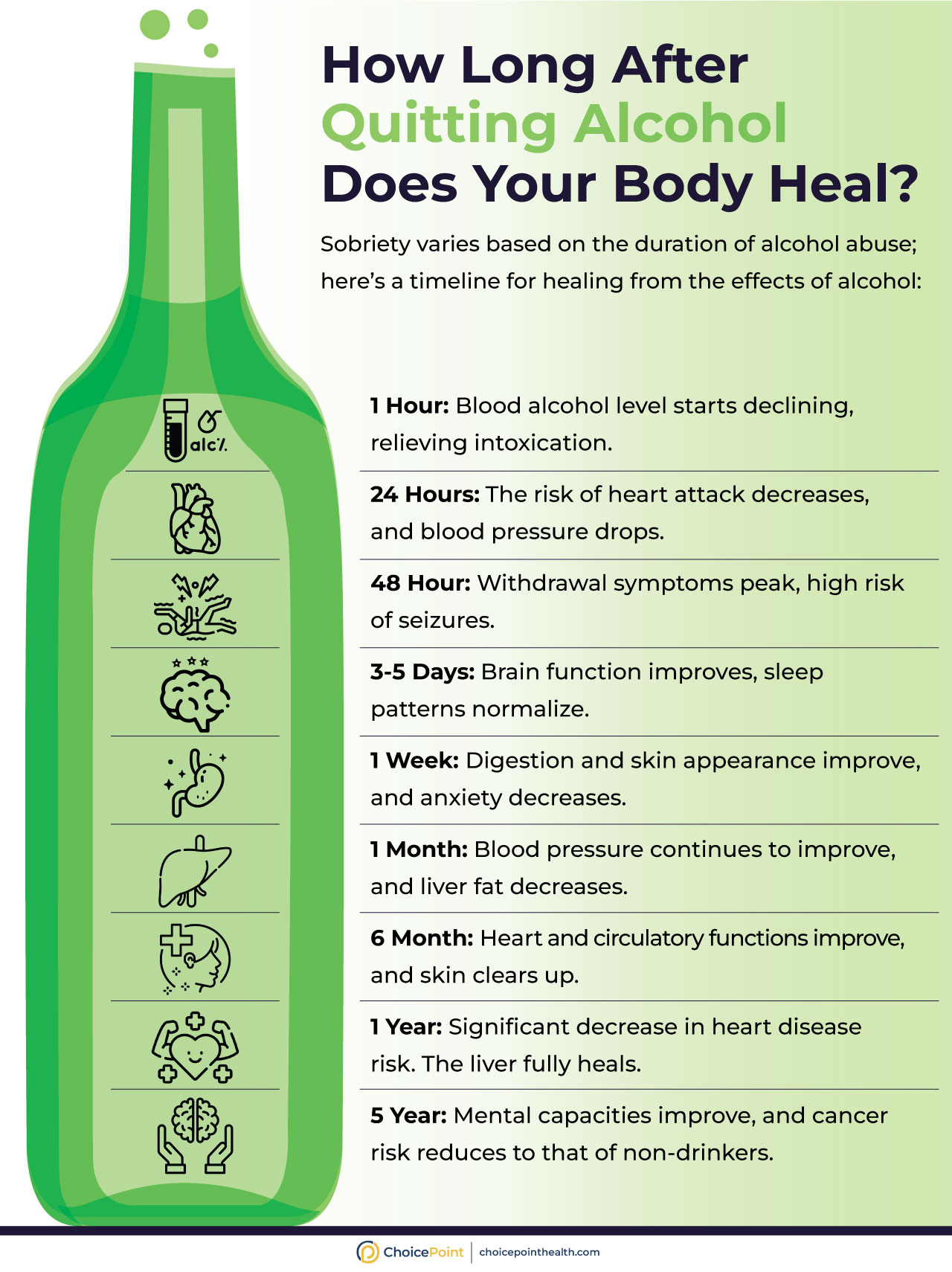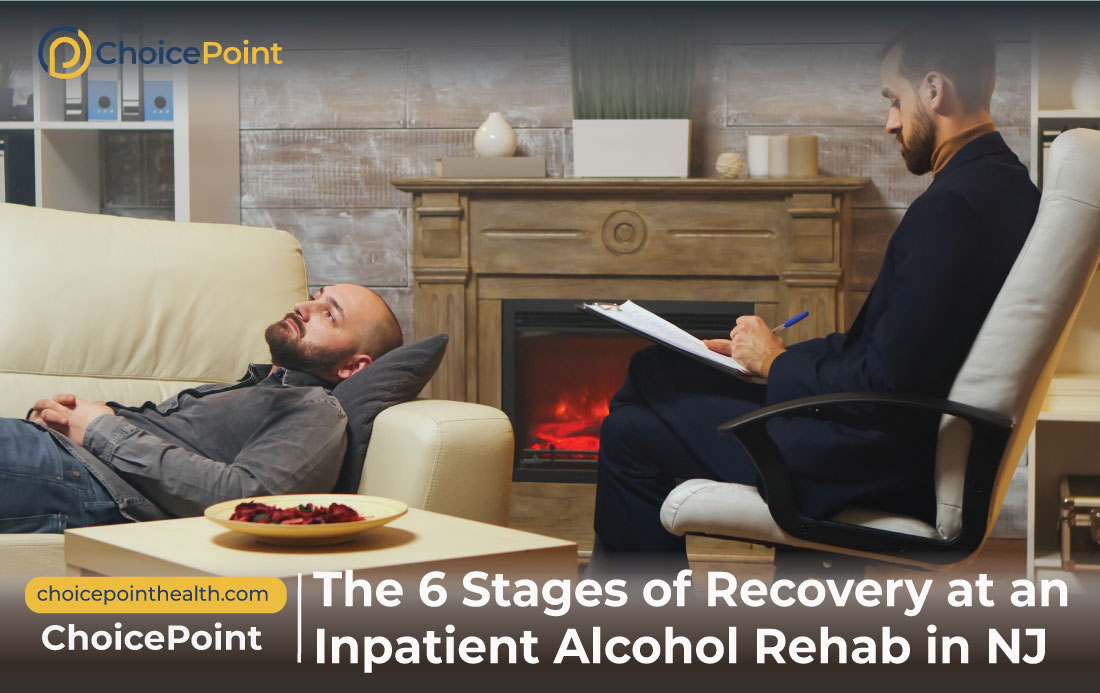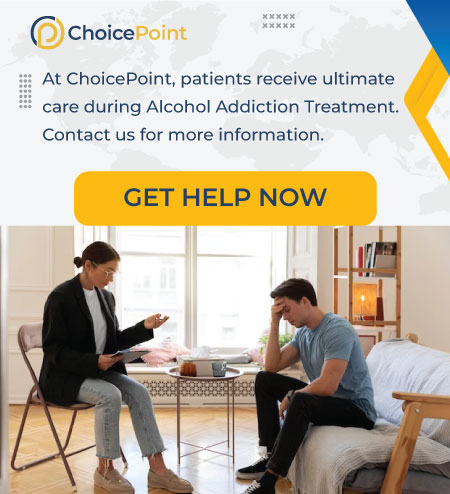Almost 3 million people worldwide lose their lives yearly to the curse of alcohol addiction. It is one of the most abused substances in the world. Unfortunately, in many countries, it is legal, too. While alcohol addiction is quite easy to develop, it is challenging to overcome. However, with motivation and commitment, patients can quit alcohol for life. If you wish to discover the stages of recovery at an Inpatient Alcohol Rehab in NJ, keep reading!
If you or a loved one is suffering from Alcohol Addiction, ChoicePoint is just a click away. Don’t Wait. Contact us now 844.445.2563 and learn about the personalized addiction treatment programs!
Table of Contents
The Stages of Recovery at an Inpatient Alcohol Rehab in NJ
Despite what people say, getting admitted to inpatient rehab in NJ is not as scary as it sounds. Here are the different stages:
Stage#1- Evaluation and Initial Assessment
The first step of receiving treatment at inpatient alcohol rehab in NJ is an initial assessment. During this step, the patient undergoes a detailed evaluation. The DEA-certified staff may ask questions to understand the patient’s background. They will also ask for a substance abuse history to plan the best possible treatment.
The assessment includes:
- A physical examination to identify any underlying medical issues. This may involve lab tests to determine the internal damage caused by the substance.
- A psychological evaluation to diagnose any mental health disorders.
- A detailed discussion of the patient’s drinking history and how alcohol has impacted their career, relationships, and finances.
- Examining other problems like chronic pain, lack of family support, or career struggles.
PRO TIP: Do not hesitate to give honest information. All information provided by the patient is strictly confidential.
Take this 5-minute-long addiction assessment quiz that may help to determine the level of your alcohol dependence.
Stage#2- Planning and Treatment Design
The planning step is crucial because the professionals at inpatient alcohol rehab in NJ design a customized treatment plan based on the individual’s unique needs and situation.
The planning phase includes;
- Creating an optimal alcohol addiction treatment strategy
- Assessing what medication to offer (Naltrexone, Vivitrol)
- Choosing the best therapies (CBT, DBT)
- Providing awareness and education
- Providing a safe and supportive treatment
Stage#3- Purification Phase or Detoxification
At this stage, the treatment officially starts. Detoxification is the first process of the treatment stage. It involves stopping alcohol intake and prescribing FDA-approved medications to manage withdrawal symptoms and reduce alcohol cravings. In addition to abstinence, detoxification also includes providing physical and emotional comfort through
- Rest periods and comfortable room settings
- Soothing activities like gentle stretching or music therapy
- Counselor support during difficult emotions
- Slowly tapering medication doses
- 24/7 supervision in case of emergency
Stage#4- Implementing FDA-approved MAT Program
While detox may be very effective, sometimes it alone is not enough for sustainable alcohol recovery. Another important part of treatment is medication. Many inpatient alcohol rehabs in NJ offer MAT treatment as part of their addiction treatment program. MAT (Medication-Assisted Treatment) is administered to those patients with a severe substance or alcohol abuse history. Here is a brief outlook of what happens during this stage of recovery:
- Under medical supervision, patients are prescribed FDA-approved medications to help ease withdrawal symptoms and support recovery.
- Patients undergo an evaluation to determine if medication may be beneficial as part of a treatment plan.
- The medical team considers the patient’s substance use history, mental health conditions, and other medical issues when making medication decisions.
- The healthcare providers may closely monitor patients taking medications.
- Dosages are adjusted as needed, and medications may change depending on how the patient responds.
- Patients are also educated about the purpose and effects of medications so they understand how they support recovery.
Some doctors may choose to continue medications even after rehab to prevent relapse. Common FDA-approved medications used in Inpatient Alcohol Rehab in NJ include:
- Benzodiazepines to help alleviate withdrawal symptoms.
- Antidepressants to stabilize mood and reduce cravings.
- Naltrexone or acamprosate to reduce cravings and support abstinence.

The Benefits of Giving up Alcohol
Stage#5- Promoting Mental Health by Integrating Psychotherapies
Treating substance abuse cases is not centered around abstinence and medication. Alcohol addiction is a complicated dynamic that requires different treatment strategies to overcome the habit. Psychotherapy plays a significant role during inpatient rehab care to achieve long-term recovery. Patients are engaged in life-saving therapies to cure addiction on a psychological, emotional, and behavioral level.
Some therapies offered at an inpatient alcohol rehab in NJ include
- Dialectical Behavior Therapy Program or DBT to change thought patterns and negative behavior.
- Cognitive behavioral therapy or CBT and motivational interviewing
- Group counseling for peer support, self-esteem, developing coping skills, and more.
- Family counseling plays a significant role in mending broken relationships
- Dual diagnosis treatment for patients who have a substance use disorder and are also struggling with mental health issues.
- Psychoeducational groups help to teach about the nature of addiction.
- Experiential therapies like art, music, or adventure therapy allow emotional processing through creative activities.
- Wellness activities such as yoga, meditation, or exercise promote overall mental and physical health.
Stage#6- Preventing Relapse Through Aftercare & Support
After the treatment completion, the next goal is to ensure long-term sobriety. The best way to do so is by extending aftercare and support to patients even after they have left the inpatient rehab. Aftercare is essential for reducing the risk of relapse and achieving full sobriety. Before exiting the facility, rehab staff develop an individualized aftercare plan for each patient. This plan includes a complete history of the patient, the treatment offered, and recovery goals.
The aftercare stage generally includes;
- Outpatient, Telehealth treatment, and counseling once a week to ensure patients stay on the path of recovery.
- Medication management from a doctor to continue medications that support recovery.
- Attendance at 12-step meetings or other recovery support groups.
- Close monitoring of the recovery progress of patients and offering help where necessary.
Final Thoughts About Recovery at an Inpatient Alcohol Rehab in NJ
Recovery from alcohol addiction is a process that takes place in several stages, from initial assessment to treatment and then aftercare. The inpatient alcohol rehab center in NJ offers a structured, holistic approach to treating alcohol addiction on physical, mental, and social levels. While the path to recovery is difficult, it is worth taking. On the other side, immense rewards of health, relationships, purpose, and an improved quality of life await you.
Let the doctors help you, and if you have any more questions, contact ChoicePoint’s DEA-certified practitioners at 844.445.2563.
Key Inquiries Regarding Recovery at an Inpatient Alcohol Rehab in NJ
Here are some key inquiries that people may have.
1. What is Alcohol Use Disorder?
Binge drinking regularly can result in an alcohol use disorder (AUD). It may be defined as a problematic pattern of alcohol use accompanied by clinically substantial impairment or distress.
2. Who is at Risk for Alcohol Use Disorder?
At times, alcohol addiction may run in some families. The environment in which a person lives may also have an impact. Other factors, such as low self-esteem or impulsiveness, may increase the likelihood of developing an alcohol use problem.
3. How Common is Alcohol Use Disorder?
In the U.S., 17 million adults have alcohol use disorder, more prevalent in men (17 out of 100) than women (8 out of 100) during their lifetime.
4. What is the Role of Inpatient Rehabilitation in New Jersey?
There are 50 residential facilities and 14 inpatient facilities in New Jersey. Inpatient alcohol rehab in NJ provides a controlled environment for intensive therapy and transition planning, which includes home modifications and healthcare services. It also prepares patients for a successful return home.
5. What is the Complete Checklist for Leaving Inpatient Rehab?
The complete checklist before getting admitted to inpatient rehab includes:
- a personalized aftercare plan
- follow-up appointments with therapists or counselors
- support group referrals
- medication management instructions
- Commitment to ongoing therapy and recovery efforts
6. How to Convince Someone to go for Inpatient Rehab?
Here are some ways to convince some to go for Inpatient rehab:
- Express genuine concern
- Present concrete examples of their difficulties
- Emphasize the possibility of positive change
- Offer to assist them throughout the process
Medical Disclaimer:
ChoicePoint aims to improve the quality of life for people struggling with substance use disorder and mental health issues. Our team of licensed medical professionals research, edit and review the content before publishing. However, this information is not intended to be a substitute for professional medical advice, diagnosis, or treatment. For medical advice please consult your physicians or ChoicePoint's qualified staff.










Review The 6 Stages of Recovery at an Inpatient Alcohol Rehab in NJ.